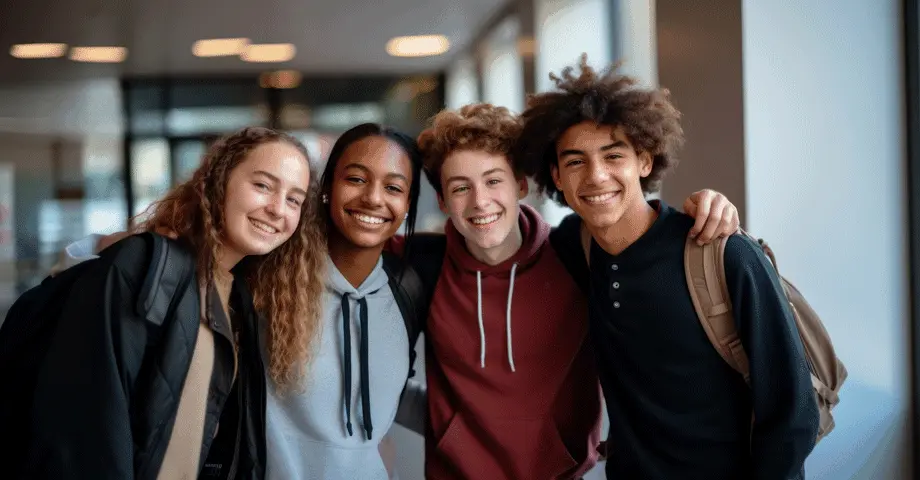
Approaches to Expressing Care
Ten approaches that can be integrated into classroom or program activities that build the Express Care element of the developmental relationships framework.
Relationship-building approaches are techniques you can integrate into program or classroom activities. They also can be worked into the informal interactions you have with young people in the hallway, after class, on the playground, on the hiking trail, or on the front steps while they wait for a ride home.
We may care deeply about our students or youth, but they may not see or experience that care, particularly if we’re not good at expressing it. Consider the following everyday actions—some that you likely already do—that communicate that you value each young person, and help young people come to know they can trust you. Which approaches do you see being most valuable and feasible for you and the young people you see regularly?
Relational Practice
Approaches to Expressing Care
Resource Audience
Resource Type
Read Time
Participants
-
Learn names and how to pronounce them quickly and correctly soon after you meet young people. Politely correct others who mispronounce young people’s names. It may seem like such a simple thing, but greeting young people by their name (correctly) can often make a big difference in helping them know that you care about them. This can be especially powerful and important for young people from cultural backgrounds that are different from yours.
-
Share your own pronouns when introducing yourself, and encourage young people to share their pronouns as well. Use the pronouns young people use for themselves and politely correct others who misgender them. If you use name badges in your program, include pronouns on name tags. Use “they/them” as default pronouns, rather than assuming someone else’s pronouns.
-
When a young person is talking, give them your undivided attention and demonstrate your interest in what they have to say through eye contact (unless you are in a culture where that is not appropriate), nodding, and asking clarifying questions. Young people notice when adults are only half listening while checking their phones. Revisit topics young people bring up to demonstrate that you notice what they are saying “Hey, didn’t you have a game last weekend? How did it go?”
-
It may feel vulnerable to you, but young people love to hear about how you came to be the person you are today. Share information about your life (within appropriate boundaries, of course) and connect your experiences to what young people are going through today. This sense of shared experience can powerfully strengthen interpersonal connections.
-
Unless you are concerned about a behavior that needs to be shared with another professional, keep what young people tell you confidential. During Search Institute focus groups, young people have told us it breaks trust if they feel that “the adults talk about us behind our backs” in a negative way. Be sure to follow through on the things you say you will do. If, for some reason, you can’t keep your promise, take time to explain why and, if appropriate, apologize.
-
Periodically ask young people how they are doing. Note if you see a marked difference in their behavior: “Hey, you seem a bit down today. Do you want to talk?” If you learn that a young person is struggling with something during one of these check-ins, be sure to proactively check in again with that young person to see how things are going.
-
If a young person opens up to you about a challenge they are facing, give the young person a chance to describe what happened, tell you how they are feeling, or just vent before you offer advice or guidance. Ask if they would like your input on how to address the situation.
-
Use humor and model a positive attitude. Try not to be serious all of the time. Goof around with young people, and be willing to make fun of yourself. Young people appreciate when adults have a positive attitude and can have fun with them.
-
Celebrate a young person’s success or accomplishments in the way they most appreciate. Some people prefer public recognition; others prefer private recognition or having their success shared with just a few close friends or family members. Let them know that you recognize effort and minor achievements, too.
-
Attend sporting events, concerts, presentations, graduations, and other activities that matter to young people. If you tell a young person you’ll be coming to an event, do all that you can to be there. Young people have told us it means a lot to them!
Related Resources on Social and Emotional Development

Video
We Meet Them Where They Are
A 5-minute video introducing five Search Institute partners working in marginalized communities.

Relational Practice
Approaches to Challenging Growth
Ten approaches that can be integrated into classroom or program activities that build the Challenge Growth element of the developmental relationships framework.

Video
State of Developmental Assets Webinar 2025
Actionable insights on Developmental Assets and their impact on youth wellbeing in our free webinar featuring expert discussions and valuable resources.
Related Resources on Diversity, Equity and Inclusion

Activity
Inspiration Wall
Activity where participants name people who have inspired them and work together to create an inspiration collage.

Relational Practice
Approaches to Providing Support
Ten approaches that can be integrated into classroom or program activities that build the Provide Support element of the developmental relationships framework.

Activity
Blindfold Adventure
Activity where participants guide a blindfolded partner from one point to another, learning and demonstrating the importance of giving and receiving help.